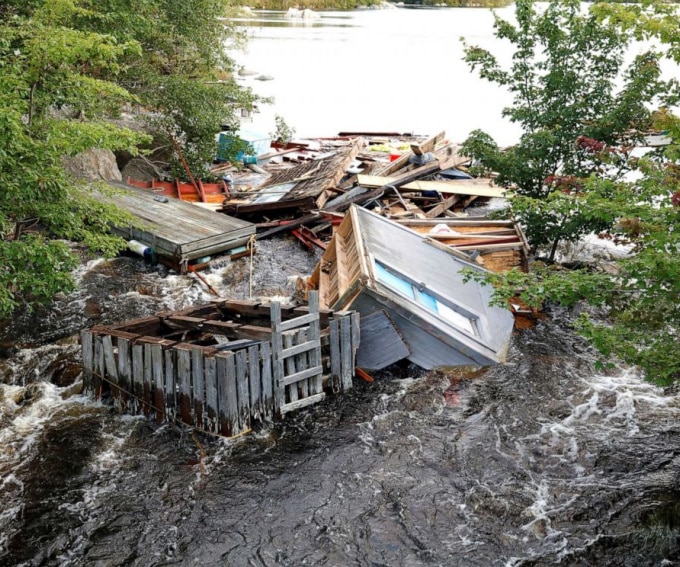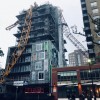
KJIPUKTUK (Halifax) – The day to day life of many people living in poverty often includes feelings of frustration, loneliness, isolation, stress, anxiety and depression. Storms and hurricanes tend to make things worse.
This weekend of hurricane Dorian I have been in touch with a lot of people living in poverty.
During storms the social isolation they experience in their day to day lives gets even worse, they say.
See also: Be prepared: Dealing with a natural disaster when you’re poor or disabled
I hear some were upset that the evacuation centres were not located within walking distance from where we people who live in poverty live. However, they may not have understood that these evacuation centres were only intended for people who live right on the coast who were asked to evacuate their homes.
Because Metro Transit suspended bus service, and because we cannot afford taxis it was hard to get to a friend’s or family member’s place.
Community Services does not allow us any extra allowance for storm preparation supplies and emergency kit. Such an allowance is not even available as a special need, we are told by our caseworkers.
Their were rumours going around in the community that on Sunday there were going to be comfort centres set up. However, actual locations of these comfort centres were not well advertised.
How can we eat during a power outage when our stoves are not working due to power outage and the soup kitchens and drop-ins will not be open during the storm, they ask.
Anyway, these are the kind of things that inspired me to do this story.
On Saturday morning and on the Friday before the storm I had a sit down with several income assistance recipients who were hoping that they would wake up on Saturday only to find out the weather was wrong about the forecast. On Friday I sat down with William, who I talked about in this story here: The double stigma of poverty and mental health. He told me he spent all week worrying about the storm.
“Kendall, what I am concerned about is every time there is a bad storm happening mental health services offers nothing I can go to keep myself out of social isolation,” he says. “On a day like this my anxiety goes up, and my only option is going to the QE2 emergency.”
Just to let the readers know, I did check in with William just now, and found out some good news. His sister, who lives in Truro ended up driving to Halifax late Friday to pick him and brought him down to her place for that weekend of the storm. She returned him to his apartment in Halifax early Monday morning.
I also had a sit down with Jenny and her friends. I have written about them in these stories here: Shopping for Thanksgiving dinner, A helping hand, community lifts young woman out of poverty, and Home for Christmas.
Jenny told me that when she heard about the storm she felt really bad that this was a weekend that she would not spend with her three friends who are on income assistance. She put together packages for her friends with candles, flashlight, batteries, and other items.
Jennie’s friends were also worried how they were going to get through the weekend dealing with the storm.
Many others experienced loneliness and social isolation during this storm.
On Saturday morning, before the storm hit, I sat down with a few other income assistance recipients, who asked not to be identified. They outright told me that during a storm their anxiety and depression levels go way up during a bad storm.
They told me it gets worse when Metro Transit cancels bus service. They do not have friends with vehicles, and with soup kitchens not being open they have nowhere to go. They were telling me that “we sometimes wonder how we make it through a storm without killing ourselves. We do not have the same resources as financially better off people. We believe the city and the province need to be more considerate of those living in poverty when it comes to setting up places like evacuation and comfort centres,” they said.
Let’s hope the city and the province do better the next storm, that is one thing we all agreed on!
Kendall Worth is an award-winning anti-poverty activist who lives with disabilities and tries to make ends meet on income assistance.
With a special thanks to our generous donors who make publication of the Nova Scotia Advocate possible.
Subscribe to the Nova Scotia Advocate weekly digest and never miss an article again. It’s free!




You bring up some valid concerns Kendall. This should be something that the politicos are emailed, so they can consider this in the future.
I was just thinking about this today, we fared well because we have camping supplies such as coleman lanterns and cook stoves, what about those who do not have those things, what happens to them ? I wonder and worry about them. I was worrying about one family I know who the mom works, but they are still low income, it has to be scary to not be able to afford the extra’s of security and convenience when disasters and difficult weather strikes .. We need to be able to do something for these people.
I am 58 and disabled ,what I get for long term disability has not changed in years ,a single person is allowed 500 a month for rent , and I get 452 a month to pay everything else , that is not enough to live on ,and you can’t rent a room for 500 a month , ,the only reason I am not homeless is I get a small subsidy from housing for rent ,but I shouldn’t have to rely on that, I shouldn’t have to worry about food or clothing , I just had colon cancer surgery ,I cant even clean my one place , and thats on top of being hit by a car in 2007, I want to work, but I live in pain,I don;t drink ,smoke or use drugs , all I want is to be able to live ,
The truly poor barely notice the difference. Everyday is a struggle, no fare for public transportation, living on the streets, finding shelter where they can. Eating from food lines or garbage bins. Struggling with addictions and being shunned by the majority of society.
Kendall; On Saturday morning, I thought quite a bit about how the storm would impact the homeless, the working poor, the isolated, and those with mental and physical health issues. Their were many people who could not get or afford hurricane supplies or go to a safe place because of their income, lack of transportation, health care issues or limited mobility. Your article captured their situation and highlights the fact that we need to find a way to better help these people before the next hurricane, flood, snow storm.
This is a thought provoking article and doubly so as personal comfort is the normal reaction in any strained situation. Afterward comes concern for family, friends and neighbors. Without this reminder he most vulnerable in our society are scarcely given a thought. It would be still another oversight to neglect criticizing both government and NSP for their failures to act more proactively in regards to such matters. Most of the hardships faced as a result of Dorian might have been mitigated with better leadership and a concern for the entire population in the face of the obvious indicators of more seriously disruptive weather. NSP has taken more of its profits to rebuilt its switching systems to permit by-passing / isolating destructed areas and sending available power to area left without power for 5-6 days when there was no damage in their area.